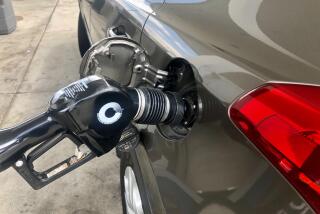Saying ‘No Tanks’ to Alcohol Problem
- Share via
Question: I have trouble with leaking gas tanks. I bought a new Ford Thunderbird in 1978, and everything was fine for about two years until it started leaking. I would patch a section and then shortly after another area would start to leak. I finally said to myself: “No more Fords.” In 1985, I bought a new Chevy pickup. It was fine for about two years, and then the same thing started to happen again. I took the tank cover off and painted it with a rust-inhibiting paint, but it didn’t help. I suspect that my problem might be that methanol was mixed in with my gas, since I have read that you need a special gas tank to use with methanol. Could this be my problem? And is it possible to buy a test kit to see if I am being ripped off?--J.J.
Answer: It is possible that methanol, which is a type of alcohol, is being added to your gas without your knowledge.
Ordinary gas tanks have a special plating inside called terne, which is a lead tin plating that is used to retard corrosion of the steel tank. It is not uncommon for water to collect in gasoline, so the terne plating is supposed to prevent water from rusting out the tank.
Methanol is very corrosive and can eat through the terne. If methanol is properly blended and contains corrosion inhibitors, then it usually can be used safely. But once a pinhole develops in the terne, the methanol can eat through the carbon steel outer tank.
It is typical for persons using high concentrations of methanol regularly to refit their vehicles with stainless-steel tanks, which cannot be corroded by even badly blended methanol. One alternative fuel that needs a stainless-steel tank is called M-85, consisting of 85% methanol and 15% gasoline.
Ford, General Motors and Nissan recommend against using fuels that contain more than 5% methanol. Chrysler, Toyota, Mazda and Honda recommend against using fuel that contains any methanol.
Many states, including California, have laws requiring gasoline retailers to state whether their fuel contains alcohol. Generally, fuels do not contain alcohol because it is more expensive than gasoline, even with federal tax incentives. But alcohol does boost octane, and it is sometimes used for that purpose and as a gas line antifreeze. You shouldn’t confuse methanol and ethanol, another type of alcohol that isn’t as corrosive.
As for a test kit, they are not generally available. If a chemist were to look for alcohol, he would measure a given volume of gasoline in a graduated laboratory cylinder and then add a quantity of water. If alcohol is present, it will combine with the water and result in an apparent increase in the water volume and a reduction in the gasoline volume. For example, if you were to mix 100 cubic centimeters of fuel that contained 10% alcohol and 10 cubic centimeters of water, you would end up with only 90 cubic centimeters of fuel and 20 of water.
Q: I have a 1985 Oldsmobile Cutlass Supreme, purchased new and driven only 12,340 miles. Service station attendants have always added water to the reservoir, but the dealer told me to not let anybody add fluid. But if they don’t add the water, the car seems to overheat. No leaks were found when the cooling system was pressure-tested. What could be the problem?--M.M.
A: If you have to add water periodically, you may have a leak somewhere in the system. A pressure test, in which a mechanic puts a gauge on the radiator and adds pressure to the system, should have verified that it is leaking.
Whenever a motorist has a difficult-to-diagnose cooling problem, it always pays to make the lowest-cost and most obvious repairs first. Try replacing your radiator cap. It has two valves on it, one that allows pressure to be released from the system and another to allow fluid to be drawn back into the radiator. A malfunctioning valve could cause the problem and would not show up in a pressure test.
Vartabedian cannot answer mail personally but will respond in this column to automotive questions of general interest. Do not telephone. Write to Your Wheels, You section, The Times, Times Mirror Square, Los Angeles 90053.






